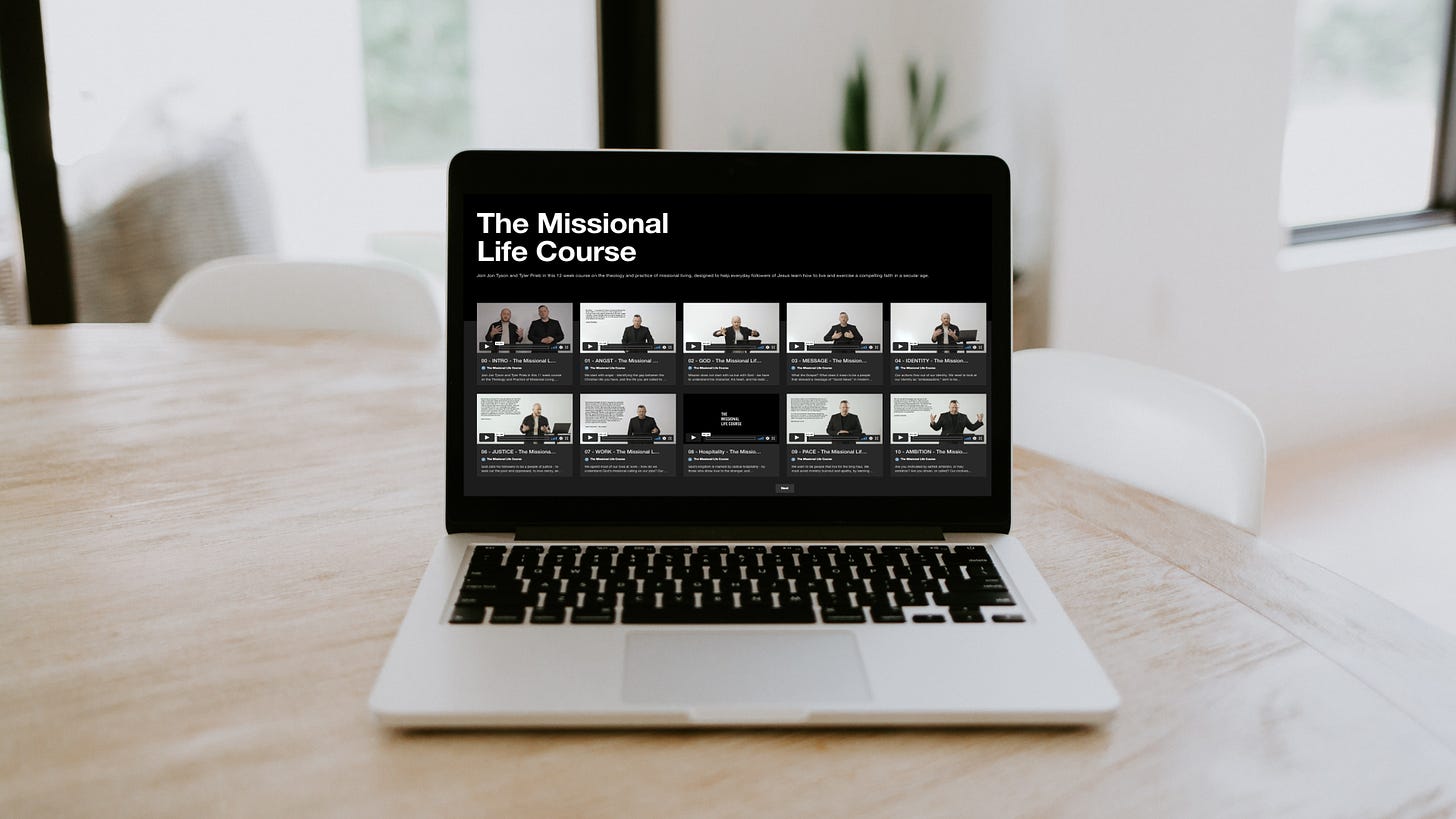Hey everyone!
It’s been a minute - we’ve had the weekly digest on the shelf, because we’ve been working hard on the Missional Life Course, which launches today!
More below on that! The weekly digest will be back ASAP.
Let me know what you think, and don’t forget to subscribe and share.
Today is a big day for us at Missional Labs - it’s the launch of our first digital resource, called the Missional Life Course, in partnership with Jon Tyson - available now for individuals, groups, pastors, and the Church at large.
It’s a 12-week curriculum, with HD videos and a 100 page PDF field guide - full of our best thinking, frameworks, and tools for mission- that anyone can download and work through.
I’ll explain more below on the vision and rationale of the course below, but you can start with yesterdays twitter thread that I wrote, explaining some of it:


Or, you can get a feel for the thinking behind the course from Jon Tyson - (sorry about the bad IG screen grab here, but you get the idea):
What is the Missional Life Course?
The course is a practical framework for missional discipleship - we want to help people integrate the ideas and tools for living on mission in the public square, such as:
Theology of Mission
What is the Gospel
Evangelism
Justice and Mercy
Faith and Work
Hospitality
Designing your Life
Navigating Ambition
Why?
Well, we think that "mission" has lost some luster in the 21st century, particularly in the western context.
It often either sits on the spectrum of oppression (coercion, colonialism), or remains the job of the super-Christians, etc.
And so, we shrink back - we don't seem to have a robust, positive imagination for mission, even though we know it’s an intrinsic part of our faith, and a mandate for following Jesus.
We want to join Jesus in what he’s doing - but many churches I observe (especially in western cities) lack a coherent framework for missional discipleship or collective action that actually embodies the whole "missio dei."
Instead, it gets siloed or put on the shelf. Global mission, for example, can feel weird and timid (Should we even? Missions trips are bad now. Where do we start?)
Local mission often gets collapsed into evangelistic programs, justice-oriented activism, faith and work courses, or local charity.
These are not bad, as far as programs go, but it's not the full Missio Dei.
So by default, we end up leaving "mission" to the atomized individual. This, then, becomes a discipleship and public witness challenge for the church, in a number of directions.
As atomized individuals, individuals face massive cultural forces that challenge the credibility and plausibility of the Gospel and can leave them paralyzed.
They can also simultaneously face major challenges of the self - whether through wounds, addiction, trauma, sin, etc, that leaves them powerless.
Recognizing this, we began to call this "missional angst" - the gap, at the individual level, between one's personally-held Christian faith, and their desire and ability to live it out in compelling ways in public and social spaces.
The urgent problem is that the angst can't last - it gets discharged, either in the loss of credibility of the faith into deconstruction, and into new narratives of meaning for the individual outside of the historic faith.
Or, perhaps into compartmentalization, apathy, lukewarmness, and “managing our faith,” which is essentially a functional nominalism.
Or, more hopefully, in deep healing, personal equipping, and the recovery of the story of what God is doing in the world, leading to a more empowered “sending” of the individual into their own context.
What’s more, at the macro-level, we recognized that this framework seemed to be missing.
The Church has often developed theology, tools, and frameworks for private discipleship practices in other domains - prayer, for example, or personal devotional.
But we couldn’t find an integrated framework for missional practice that works for the everyday individual that won’t spend their time reading missiology.
And so, we reflected on our work at Church of the City, we went back to missiological first principles, and we re-read all of the books on mission and discipleship.
We sought to build a framework that could help the average person in our congregation close the gap on their "missional angst" and live on mission in their everyday spaces.
The course has three parts - theology, practice, and integration:
Theology is missional reflection on the Biblical story, the compassionate and missional heart of a loving God, an understanding of the Kingdom, and our role as "ambassadors."
The practice section focuses on the core principles of integrated mission - evangelism, justice, mercy, vocation, hospitality.
The integration section helps the individual think about motives, ambition, pace, designing their life around mission, and finding the "redemptive edge."
Our hope is that this can be "software" for the church in the West to help equip their people for everyday, non-heroic missional living in a way that manifests into their public lives in the world.
The first version of the course launches tomorrow - make sure you're on the mailing list, and check it out!




